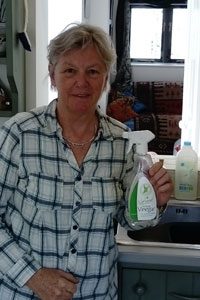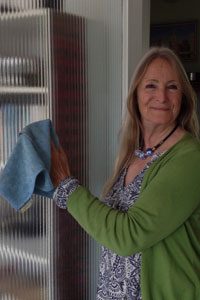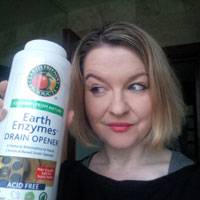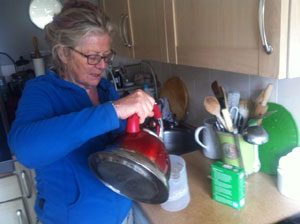By Jill Goulder & Julia Waterlow
With spring here, Jill Goulder and friends have been talking about household cleaning and how we can avoid using commercial chemicals and be a little simpler in our habits.
Who are we?

Essential for de-limescaling: Jill favours distilled white vinegar
Julia is our eco cleaning poster child, with barely a branded cleaner in her Eco House. Polly is operating on a tight budget in social housing, and prefers to spend money on simple, harmless ingredients rather than expensive branded cleaners. Jill, another Eco House owner, likes to know how things work, so she’s enjoying exploring recipes for home-made cleaning liquids. Juliet, a member of Transition Town Lewes, confesses as ‘semi-eco’, worrying (needlessly) that she has quite a long way to go.
What’s your favourite green cleaning item?
Polly and Jill both swear by distilled white vinegar.
Polly: ‘I really like the smell and the way it freshens up all things from the bathroom to the fridge.
Jill: ‘It’s amazing on limescale all round the house, and I chuck some in the washing-machine during washes to soften the clothes and descale the machine.’

Julia uses microfibre cloths all round the house
Julia and Juliet couldn’t live without their microfibre cloths: ‘They clean efficiently without scratching and without the need for anything except water’ says Julia, who uses them for every surface in her house, horizontal and vertical, with a bit of washing-up liquid for greasy surfaces; they survive for years of using and putting through the washing-machine.
Polly and Julia also specially praise citric acid for loos. Julia says ‘Plenty of people don’t realise that grubby loos are mainly due to limescale build-up. Just sprinkle plenty of citric acid powder round, leave it overnight and scrub it in the morning.
’What mainstream product can’t you do without?
All four of us have Ecover washing-up liquid rather than using a ‘basic’ ingredient. Jill explains ‘The surfactants in them (that makes your washing-up squeaky clean) are hard to reproduce. But go for biodegradable-surfactant wash-up like Ecover to minimise the harm to water-life’.
Julia uses Ecover dishwasher tablets, and Ecover limescale remover at times. Juliet uses a commercial limescale-remover every now and again for built-up limescale (otherwise using a plant-based remover).
Juliet uses biological laundry-tablets on occasion for heavy-duty clothes cleaning, and Jill keeps a small pack of commercial washing-powder at the back of the cupboard for a hot wash a couple of times a year to combat the slimy fungus endemic in Lewes water that otherwise leads to sinister smells in the machine: a washing-machine repairer told her that the local fungus laughs at eco washing liquid. Juliet puts Calgon tablets in the washing-machine and her shower to keep the macerator clean.
What else is in your cleaning cupboard?
Julia also has eco-balls (these go in the wash instead of laundry powder or liquid and ionise the water, lifting the dirt out of clothes) and bicarbonate of soda for smelly drains. Juliet has white wine vinegar, bicarbonate of soda, and Ecover, Method and other cleaning products; she’s tried eco-balls but doesn’t feel that she’s got the hang of them yet.
Polly says ‘Bicarb, lemon juice and a bottle of Ecover wash-up (I get the bottles refilled) plus some citric acid for my elderly loo!’
Jill is delighted to have successfully started making her own laundry liquid, made of borax substitute, washing soda, soap-flakes and water. She says ‘I love knowing exactly what I’m cleaning my clothes with’. She also worries about grease etc going down the drain (as does Julia – see her recent piece on this at Wetwipes and fatbergs) and so cleans all greasy/ food-containing plates with kitchen roll (or newspaper), putting the used paper in the food waste caddy.
What’s your pet hate about modern cleaning products?
Juliet: ‘The acrid smell. Lots of eco products use orange oil and other natural oils so your home smells great after you clean it.’
Polly: ‘Where do I start? All the plastic bottles, the perfume, colour and other rubbish that is put in to entice. And of course the need for a new bottle for every different job. I really don’t want to fill my home with more toxins – there is so much I can’t control coming in through the windows.’
Julia: ‘There is no need to buy specialised household commercial cleaning products for day to day cleaning; it’s all an advertising con. I’ve not used mainstream products in years because there are perfectly safe and ecological/sustainable alternatives.’
What’s a common myth about household cleaning?

Juliet
Juliet: ‘That it needs weapons-grade chemicals. If you can find something natural that cuts through grease that’s half the job done. Doing it regularly is half the secret; if you leave it for weeks, then yep, it’s harder work.’
Polly: ‘That you can spray it all away and the ghastly chemical fragrance will mask any problems.’
Julia asks in particular why on earth people use disinfectant, on surfaces and particularly in the loo (what are people trying to achieve?). Jill agrees: ‘I’m hot on keeping surfaces clean, and that can be done perfectly well with water (and a squeeze of washing-up liquid if needed). There’s so much evidence now that eradicating all possible bacteria from our daily life leaves us much more open to bugs and allergies.’
Julia adds ‘You don’t need to clean a lot of the time, and the world is probably a better place without all this effort, not to mention the chemicals we are pouring into our environment. But if you do, it’s not necessarily a chore; I actually think most people secretly enjoy it because it means they don’t have to do something else they would prefer not to do.’
So which way forward?
Among our four green cleaners, a theme is that each of us has a favourite and uses it all over the place; this is great for beginners, who could start with one item (e.g. vinegar, microfibre cloths, citric acid) and get used to what it can do and work outwards from there. Eco brands such as Ecover and Method are also a good way to head off down the ‘treading more lightly on the planet’ route; worth reading the blurb on the back of their bottles as it can start you thinking about what modern products are doing to the environment.
What to use?

Polly: ‘Citric acid for a good sort-out of the loo: leave at least a couple of hours then scrub away!’
For limescale in our chalky town: distilled white vinegar, citric acid (especially for the loo), lemon juice. Just for fun – a professional cleaner tells us that she suggests vodka and coke for cleaning shower doors! (having a swig first, we assume)
For grease: borax substitute, and Ecover or similar washing-up liquid; micro-fibre cloths with the latter; Juliet likes Method’s clementine cleaner; and pre-cleaning dishes with paper (Jill)
For laundry: eco washing liquid, eco balls or home-made (check it out online – many recipes). Not buying white clothes and bedding (Julia, Juliet). For stains: bicarbonate of soda (Juliet), ‘sunshine and fresh air for white fabric’ (Polly)
Polly is also a fan of very hot water every now and again to sort out laundry (stale household fabrics, and the machine itself) and dish-washing
Smelly fridge: bicarbonate of soda (Julia), vinegar (Polly)
Where to buy:
Lansdown Health Foods (you can take your Ecover bottles there to be refilled)
Laporte’s
Bunce for some of the basic ingredients
Chemists
Infinity Foods in Brighton
Supermarkets
Summer Naturals, a family firm supplying basic ingredients




ooh dont use Calgon! Supermarkets own brands are much cheaper!
Thanks, Sara – I’ve passed that on to Juliet!